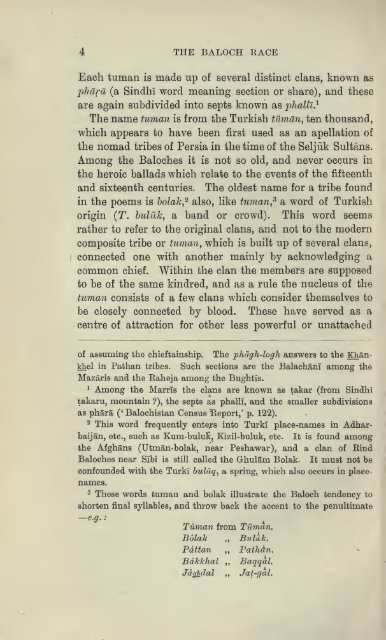You also want an ePaper? Increase the reach of your titles
YUMPU automatically turns print PDFs into web optimized ePapers that Google loves.
4 THE BALOCH RACE<br />
Each tuman is made up of several distinct clans, known as<br />
phara (a Sindhi word meaning section or share), and these<br />
are again subdivided into septs known as phalli. 1<br />
The name tuman is from the Turkish tuman, ten thousand,<br />
which appears to have been first used as an apellation of<br />
the nomad tribes of Persia in the time of the Seljuk Sultans.<br />
Among the Baloches it is not so old, and never occurs in<br />
the heroic ballads which relate to the events of the fifteenth<br />
and sixteenth centuries. The oldest name for a tribe found<br />
in the poems is bolak, 2 also, like tuman, 3 a word of Turkish<br />
origin (T. buluk, a band or crowd). This word seems<br />
rather to refer to the original clans, and not to the modern<br />
composite tribe or tuman, which is built up of several clans,<br />
connected one with another mainly by acknowledging a<br />
common chief. Within the clan the members are supposed<br />
to be of the same kindred, and as a rule the nucleus of the<br />
tuman consists of a few clans which consider themselves to<br />
be closely connected by blood. These have served as a<br />
centre of attraction for other less powerful or unattached<br />
of assuming the chieftainship. The phagh-logh answers to the Khan-<br />
khel in Pathan tribes. Such sections are the BalachanI among the<br />
Mazaris and the Kaheja among the Bughtis.<br />
1 Among the Marrls the clans are known as takar (from Sindhi<br />
takaru, mountain ?), the septs as phalli, and the smaller subdivisions<br />
as phara (' Balochistan Census Report,' p. 122).<br />
2 This word frequently enters into Turk! place-names in Adharbaijan,<br />
etc., such as Kum-buluK, Kizil-buluk, etc. It is found among<br />
the Afghans (Utman-bolak, near Peshawar), and a clan of Eind<br />
Baloches near Sibi is still called the Ghulam Bolak. It must not be<br />
confounded with the Turk! bulilq, a spring, which also occurs in place-<br />
names.<br />
3 These words tuman and bolak illustrate the Baloch tendency to<br />
shorten final syllables, and throw back the accent to the penultimate<br />
—e.g. :<br />
Tuman from Tuman.<br />
Bolak ,, Buluk.<br />
Pdttan ,, Patlidn.<br />
BdJckhal „ Baqqal.<br />
Jaghdal ,, Jat-gal.


